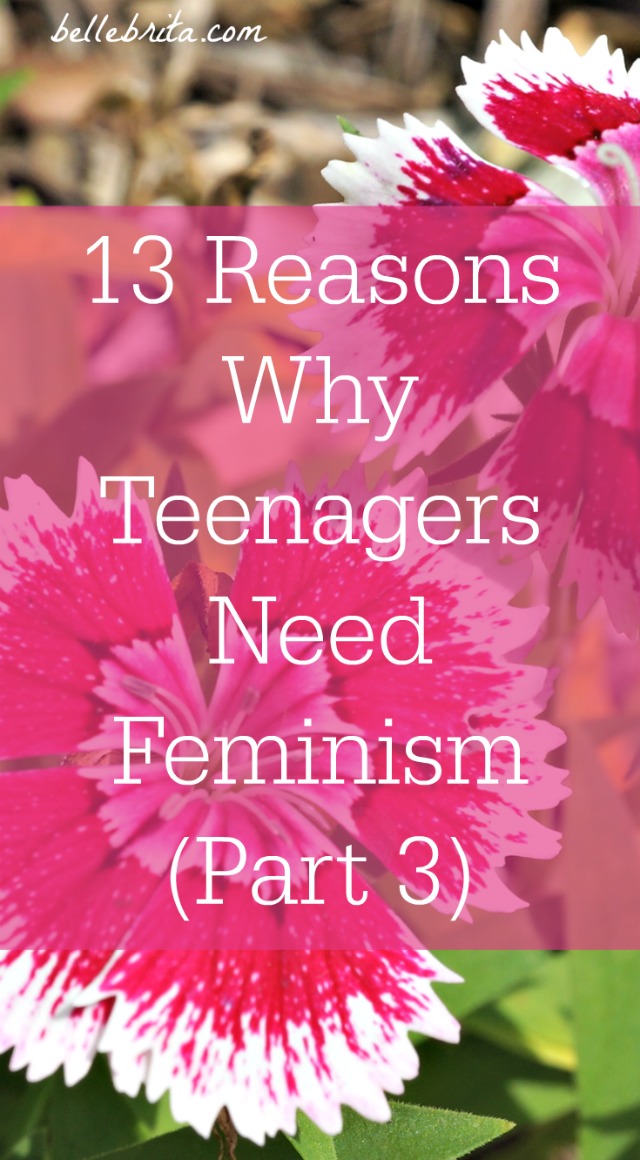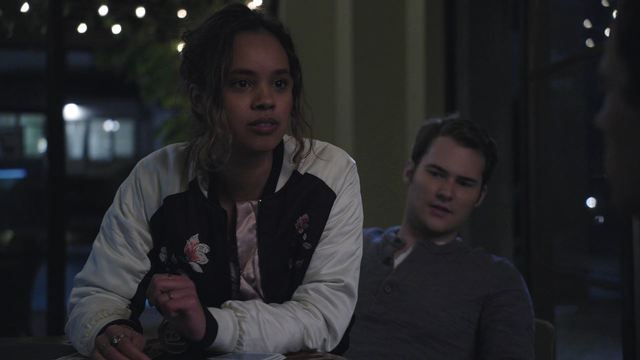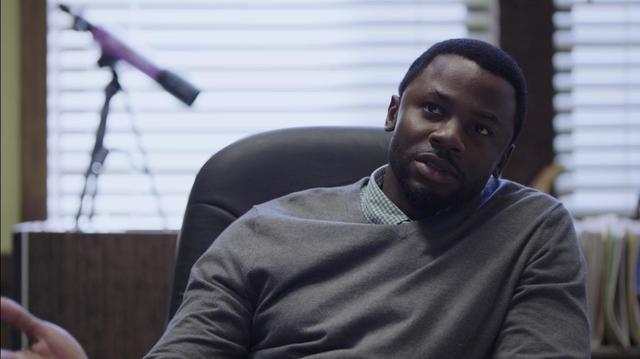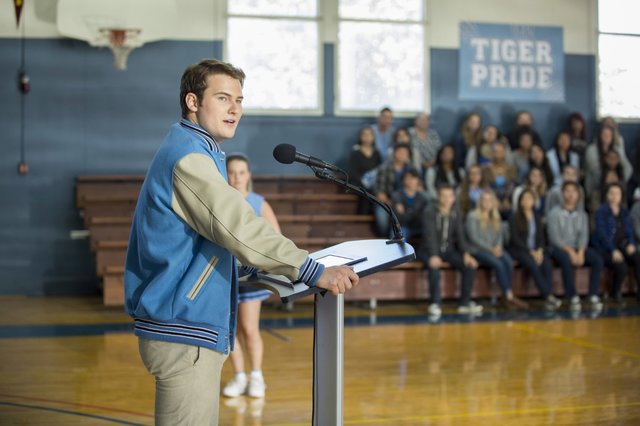This is Part 3 in a short series exploring sexist attitudes in the Netflix original series 13 Reasons Why. If you haven’t already, read Parts 1 and 2 first.
Related: 13 Reasons Why Teenagers Need Feminism (Part 1)
If you have not already seen 13 Reasons Why or read the novel, this post contains heavy spoilers. Even the subheadings contain spoilers.
Related: 13 Reasons Why Teenagers Need Feminism (Part 2)

Rape Culture in Netflix Original Series 13 Reasons Why
Several of the episodes below started with content warnings before they aired. This post discusses rape, but not in a graphic manner. While I will not go into detail regarding the incidents of sexual violence, this blog post does focus on the attitudes and actions of the characters that contribute to rape culture.
Related: Feminism 101: Rape Culture
Tape 5, Side A: Girls Who Drink Too Much are Asking to be Raped
This tape reveals that Hannah witnessed Bryce rape an intoxicated and near-unconscious Jessica. Jessica’s boyfriend, Justin, half-halfheartedly tried to stop Bryce, but it wasn’t enough. Hannah felt frozen with fear and didn’t intervene either.
Bryce feels entitled to sex with Jessica. He doesn’t care that she’s wasted or that she’s passed out in her room. He doesn’t even care that Jessica has a boyfriend–Justin, Bryce’s best friend.
Bryce doesn’t even try to hide the fact that he’s going to rape Jessica (probably because he doesn’t realize sex with an unconscious person is rape). He even makes a little comment to Justin about how they share everything before going into Jessica’s room.
13 Reasons Why is a piece of fiction. But rapists attacking intoxicated, unconscious victims? That is all too true.
And then, all too often, the public blames the victim.
Does alcohol cause sexual assault?
From the article “Rape and the Intoxicated Victim” by Maggie Tennis:
The idea exists in our culture that if you allow yourself to get so drunk that you black out or pass out, then you are, in fact, inviting inappropriate conduct upon yourself, or that you are even complicit in your own rape. A perpetrator of sexual assault seizes advantage of an unfortunate presumption that a drunken individual has somehow consented to a sexual act simply by becoming black-out drunk. Or even that, by reaching such a state, the drunken individual has forfeited any right to give consent entirely. Armed with this reasoning, the perpetrator concludes that sexual advances on this person would not be considered rape.
Just this year, a judge in the UK insinuated that if women don’t drink too much, they can protect themselves from rape. She also said, “if push comes to shove, a girl who has been drunk is less likely to be believed than one who is sober at the time. I beg girls and women to have this in mind.” The judge made these remarks after sentencing a rapist to jail.
For more information on the connection between alcohol and rape, I highly recommend reading “Actually, The Link Between Sexual Assault And Alcohol Isn’t As Clear As You Think.” From the article:
National statistics dispel the direct correlation between alcohol and rape, too. The Department of Justice’s National Crime Victimization Survey has found that the number of Americans who say they’ve been raped — regardless of whether they reported that crime to the authorities — has been declining since 1979. During that same time period, binge drinking has been steadily rising. As Slate’s Amanda Hess points out, that suggests something else besides alcohol consumption is actually factoring into the nation’s sexual assault rate. Indeed, research has found that intimate partner violence declines not as people drink less, but as society moves toward gender equality.
Tape 6, Side A: Rape Survivors Behave in a Predictable Way
Throughout the series, Jessica behaves more and more erratically. She misses cheerleading practice and shows up late to games. She sneaks alcohol at school, hides alcohol around her bed, and in one disturbing scene, plays with her father’s gun.
These actions are all signs of Rape Trauma Syndrome. But Jessica does one thing that might confuse some viewers of 13 Reasons Why.
She continues to spend time with Bryce, even pursuing alone time with him.

Why would any rape victim willingly spend more time with a rapist?
Jill Filipovic addresses this in an article on sexual assault misconceptions for Cosmopolitan. From the article (emphasis my own):
It’s incredibly common for survivors to feel numb and come across as cold or unemotional, or even to make what feel like inappropriate jokes… for a victim to downplay what happened or be confused about it… for rape survivors to have sex again soon after the event, sometimes with the same person they later say raped them — it can be a way of reasserting control after control over their own bodies was just taken from them. The only universal truth about how rape victims act is that they rarely act 100 percent like characters on a TV drama.
Refinery 29 addresses this same question brought up by 13 Reasons Why (emphasis original):
Yet in many cases, a survivor tolerating their rapist at all — let alone engaging in friendship or a relationship — raises eyebrows. It becomes something that a doubter can cling to — how can you claim that you were raped by this person, when two weeks later you celebrated his birthday? When you went on a second date? When you texted him about the math homework?
That’s why Jessica’s story is important. It’s clear from episode 1 that Jessica is struggling with something, though we don’t yet know what that is. When we see her in present day, she is numbing herself with alcohol and partying — erratic behavior that doesn’t match up with the Jessica we saw in Hannah’s flashbacks. She also seeks out Bryce and hangs out with him alone, seemingly “flirting” with the person who we later learn raped her. It’s not that Bryce didn’t commit a serious crime, nor is it that Jessica has forgiven him for it. Yet by hanging out with Bryce, by pretending everything is “fine” between them, Jessica assumed, incorrectly, that it would be easier to move on.
Tape 6, Side B: Girls Who Attend Parties are Asking to be Raped
This tape reveals that while attending a party at Bryce’s house, Hannah ends up alone with him in the hot tub, where he rapes her.
In the present-day, Clay tricks Bryce into confessing the rape. But even that confession indicates that Bryce literally thinks Hannah was asking for sex. He says:
She came to my party. Mine. She got in the hot tub with me, without a suit on. Right? And she fucking–she made eyes. I know that’s hard for you to hear, that your crush wasn’t pure and clean. She fucking wanted it…
She wanted it… Me. She was practically begging me to fuck her. If that’s rape, then every girl at this school wants to be raped…
You wanna call it rape, call it rape. Same difference.
Again, 13 Reasons Why is a piece of fiction. But the public siding with the rapist? Blaming the victim for attending a party or drinking alcohol? That is all too true.
See Daisy Coleman. Despite a shocking amount of evidence (including video footage), the city dropped the charges against the rapists. And Daisy’s entire family ended up driven out of town by harassment and victim-blaming.
See the Steubenville High School rape case. People blamed the victim for going to a party and getting drunk.
A study came out in 2016 that discovered a full 25% of comments on news articles about sexual assault and rape blame the victim.
Related: Donald Trump, Rape Culture, and Feminist Fatigue
Tape 7, Side A: Girls Lie about Rape
In many ways, this final tape upset me the most. At the beginning of the tape, Hannah admits she feels slightly better about her life after recording all the tapes. She wants to give life a chance–but she needs help. So she makes an appointment with the school counselor, Mr. Porter.
Side Note: School Counselors vs. Mental Health Professionals
I read a comment online criticizing the portrayal of Mr. Porter. It basically implied that 13 Reasons Why doesn’t fairly paint mental health professionals.
I don’t know what sort of fancy high school this person attended, but my high school guidance counselors were the farthest thing from mental health professionals with any sort of mental health training or education. Mr. Porter even mentions that his previous job involved guns and gang violence (this detail is from memory, so I might have it slightly wrong), leaving him unequipped to deal with verbal harassment and bullying.
While I’ve read legitimate criticisms of the series, it’s unfair to assume Mr. Porter is supposed to be a trained mental health professional in any way, shape, or form.

An Absence of a No is Not Consent
In Hannah’s meeting with Mr. Porter, she implies she has suicidal thoughts. While she backs away from suicide in their conversation, she continues to share feelings of pain and isolation.
Hannah refers to the list that started the harassment. She mentions that the latest repercussion of the list happened a week prior. Mr. Porter carefully asks questions–suggesting that Hannah regretted consenting to sexual activity. When she reacts strongly to that suggestion, he asks if someone forced himself on her.
When she hesitates while replying yes, Mr. Porter pounces on her hesitation. “Did you tell him to stop? Did you tell him no? Maybe you consented, and you changed your mind.”
Hannah clearly objects to that last statement. Her pain is evident in her voice when asking Mr. Porter if he can guarantee her rapist will go to jail.
Understandably, Mr. Porter can’t promise that, considering how many convicted rapists serve no jail time. But this is where he completely fails Hannah.
Rape Survivors Have Options
Mr. Porter tells Hannah that if she won’t name her rapist, if she won’t press charges, if she’s not even sure she can press charges… Then she needs to move on.
He doesn’t provide a suicide hotline for her to call. He doesn’t recommend she visit a rape crisis center. Mr. Porter might not be a mental health professional himself, but at the the very least, he should refer students to outside resources. Such as an actual mental health professional.
Everyone on the 13 tapes fails Hannah in some way. Mr. Porter fails Hannah in the same way school administrators and police officers fail rape victims across the country (and world). With rape myth acceptance. By doubting rape victims. Questioning them with accusatory language and pouncing on any imperfect response.
And then by not providing any resources to help them with the trauma of rape. Rape survivors often experience Post-Traumatic Stress Disorder (PTSD) or Rape Trauma Syndrome (RTS). They need professional help–not empty advice to “move on.”
Tape 7, Side B: Rapists Lurk in Alleys
There’s not an episode for Tape 7, Side B. In the second-to-last episode of 13 Reasons Why, Clay makes one last tape–Bryce’s confession. In the last episode, Clay gives all the tapes to Mr. Porter.
Bryce is a rapist.
But he’s not a monster.
Bryce’s character is so incredibly important in 13 Reasons Why. Yes, he’s an arrogant jock who clearly feels entitled to women’s bodies. He sends the photo of Hannah to the whole school. He grabs Hannah’s ass in the convenience store.
But Bryce is friendly and outgoing at school. Even the teachers seem to like Bryce. He knows about Justin’s terrible home life, so Bryce helps out Justin with material items. When Justin needs a place to stay, Bryce opens up his pool house.

Bryce does not fit the stereotypical profile of a rapist… Unless you’re a feminist deeply aware of rape culture and the actual statistics surrounding rape.
On Bustle, Samantha Rullo goes into this very point, quoting Justin Prentice, the actor who plays Bryce.
As a show aimed at teens, it’s incredibly important that 13 Reasons Why demonstrate the very real risks of sexual assault and bullying. By making Bryce “a real high school kid,” the series shows that being a good guy on the surface doesn’t stop someone from being capable of rape.
“Most of these cases of sexual assault and violence aren’t by people who were born with different brain wirings,” Prentice says. “You know, they’re not these Ted Bundys — I mean those cases do happen of course — but the majority of these cases are opportunistic sexual assaults.” Indeed, in eight out of 10 rape cases, the victim knew their assailant, according to the National Sexual Violence Resource Center (NSVRC), and there have been multiple cases of convicted rapists’ academic or athletic achievements affecting their defense.
Rape is about more than sex–it’s about power and entitlement. Bryce has wealth and influence, and he feels entitled to whatever he wants, including sex with an unconscious girl and a girl trying to get away from him.
Bryce actually fits the profile of a rapist pretty perfectly.
The harsh reality is that rape culture kills teenage girls and women. Hannah is a fictional teen who dies by suicide after rape. Rehtaeh Parsons and Audrie Pott are real teenagers who killed themselves after rape.
Practicing kindness is too simplistic of a response to 13 Reasons Why.
All of us need to do more than just be kind.
We need to dismantle rape culture.
If this post resonates with you, please share on social media.
If you need immediate support regarding rape or sexual assault, you can reach your local RAINN affiliate at any time, 24/7, by calling the National Sexual Assault Hotline at 800.656.HOPE (4673). You can also look up local centers for rape and sexual assault survivors online.
If you feel you are in crisis, please call the National Suicide Prevention Lifeline. It is a free, 24-hour hotline, at 1.800.273.TALK (8255). Your call will be connected to the crisis center nearest to you. If you are in an emergency, call 911 or go to your nearest emergency room.

Thank you again for this series. I have really enjoyed it and the way you dissect these issues in a way everyone can understand.
I will comment on the bit about school counselors. I agree that not all of them are up to par (my school counselor in high school was more of a guidance counselor to help with class selection, etc, and very inept at helping me when I was heartbroken after a breakup and seeking some sort of solace from a 3rd party)… but my sister in law is a middle school counselor and she was required to achieve a masters degree in psychology before being considered for a position like that. I know all states differ, but I’m guessing that at least in the state of Virginia there is the requirement that counselors have psychology backgrounds.
I am so glad that you appreciate it! These took a lot of time to write since I wanted to be as accurate as possible and include as many sources.
I’m glad your SIL’s school required adequate education. It could be the state law or a county law or even just a school policy.
My high school guidance counselors basically just did the class schedules (which were always a mess) and advised on college choices (by ignoring any school out-of-state). At least mine helped me get a home set of books because I was so sick that carrying all my textbooks home each night affected me more than the typical small teenager. Otherwise, I didn’t receive much guidance or any counseling.
My counselors were the same (and the same on the in-state schools, always 4-year too! Never trades, etc,) and I went to a high school in Virginia so I can only assume things have changed since. I think it must be a state law because I think I remember her talking about the state mandating at least one licensed counselor per school, then more based on attendance. We have also had many tragedies concerning mental health in schools in VA (Va Tech massacre, a senator being shot by his mentally unstable son,) that have increased the push to solve the mental health crisis here.
I don’t see anything wrong with the judge saying that it’s more difficult to get a conviction when the victim had been drinking. Proof beyond reasonable doubt is hard. If the victim can’t remember, that makes it harder. It doesn’t sound to me as though she was victim-blaming by saying so.
I agree with the larger point, though. Alcohol does get over-emphasized, and victim-blaming is horribly common.
Given the context, it’s victim-blaming. She said the following *during the sentencing of a rapist.*
“We judges who see one sexual offence trial after another, have often been criticised for suggesting and putting more emphasis on what girls should and shouldn’t do than on the act and the blame to be apportioned to rapists,” she said.
“There is absolutely no excuse and a woman can do with her body what she wants and a man will have to adjust his behaviour accordingly. But as a woman judge I think it would be remiss of me if I didn’t mention one or two things.
“I don’t think it’s wrong for a judge to beg woman to take actions to protect themselves. That must not put responsibility on them rather than the perpetrator.
“How I see it is burglars are out there and nobody says burglars are OK but we do say ‘please don’t leave your back door open at night, take steps to protect yourselves’,” she said.
“Girls are perfectly entitled to drink themselves into the ground but should be aware people who are potential defendants to rape, gravitate towards girls who have been drinking. It should not be like that but it does happen and we see it time and time again.”
She said men do it because “a girl who is drunk is more likely to agree as they are more disinhibited” and are “less likely to fight a man with evil intentions off”. She also said women were less likely to report it if they were drunk because they sometimes cannot remember exactly what happens.
She added: “They are entitled to do what they like but please be aware there are men out there who gravitate towards a woman who might be more vulnerable than others. That’s my final line, in my final criminal trial, and my final sentence.”
Source: http://www.telegraph.co.uk/news/2017/03/10/women-get-drunk-must-protect-against-rapists-judge-says/
I was yelling at Mr. Porter through the screen.
The sad fact is this is how so many counselors in school act. They just aren’t prepared to deal with real issues (and they aren’t even good at giving college acceptance advice!).
Love all your thoughts on the series!
I hope that states and school districts move towards better requirements and training for guidance counselors. They might be the only trusted source available for students.
Wow, Brita! You did a wonderful job with this series! And I’m sure that it will help and open so many eyes. Thank you for this and thank you for also sharing personal stories with us (part 1)
I still am undecided about how I really feel when it comes to this show — as one of my readers said, I have SO many feelings and not enough words. And it’s true.
I work with teenagers on a daily basis, I’m a school nurse, and unfortunately I have encountered several sexual assault victims and rape victims as well. It’s not easy and it will never be easy. It breaks my heart. Along with that, I have also encountered students with self-harm thoughts and suicidal thoughts. Also extremely difficult — even more so when they follow through.
I applaud your for speaking up about so many of these issues!
I am curious as to why you did not cover and/or what you think of Clay and Hannah’s bedroom scene in Tape 6, side A.
Hannah tells Clay to leave three times. So he does. But Hannah says on the tapes that she actually wanted him to stay. Any then everything goes downhill from there, and Clay feels responsible because he left (as he was told to).
While Hannah does say he shouldn’t blame himself and that he doesn’t deserve to be there, Clay (and the show) do put responsibility on Clay.
What message does that send? How does a teenage boy – or any man for that matter – process what a female is telling him the next time this happens? Does he hesitate and think – is this like Hannah?
Clearly the answer is: if she says go away, go away. If she says stop or no, then stop. But the show seems to have a different answer, and Hannah having this alternate thought is one of the most irresponsible elements of the show.
What is your view? Why not address this in the original post?
There are easily 100 different things that could be addressed in this series. To narrow my focus, I set up these 3 blog posts to analyze a very specific point: underlying sexist attitudes or beliefs prevalent in the series, particularly ones that drive character actions.
Clay feels responsible for Hannah’s suicide not simply because he left when she told him to leave. The series shows many moments when he could have said or done something differently. He regrets not telling her how he felt.
It’s normal for anyone who has experienced trauma, like sexual harassment and sexual assault, to later have conflicting feelings to a similar, positive encounter. Hannah’s tape doesn’t simply say that she actually wanted him to stay–it clearly explains how conflicted and confused and overwhelmed she felt. Clay’s decision to leave when she told him to leave is obviously the correct one.
P.S. If you’re referring to boys and men, then you should also use the words girls and women, not females.
I completely agree that Hannah was confused/conflicted and fully can be. However, the message that seems to come across is that Clay’s decision is the wrong one, rather than the right one. Which I view as dangerous.
What I am asking about is your view on how articulating that confusion can be thus sow confusion in males/teenage boys/men, if the message that comes across is that even if a female/girl/woman say no/go way/leave me alone three times, that she actually means that she wants the male/boy/man to stay etc.
As an expansion to a broader point/generalize beyond this specific reference, this is part also relates to/emphasizes the culture that may have led to the ~stalker you had when you were 15. I have no details other than what you shared, and recognize this is a speculation based on that limited info, but perhaps he was looking to ask you out a second time as he had been trained that he needs to ask more than once? This is the cultural expectation: females/girls/women are expected to say no/play hard to get/etc., and males/boys/men are expected to pursue. Not saying this dynamic is right (it is not), but it the expectation and what teenage boys learn. It is not without evidence either. Any female/girl/woman that has said yes the second (or tenth) time someone approaches/asks out/etc., or tries to ‘play hard to get’ to test if ‘he is into you’, rewards that pursuit behavior, contributes that expectation and is complicit in that culture (and potentially to your negative experience). This is more an element of certain dating cultures than others (e.g. latinx culture is much more that a boy/man needs to keep asking even as the girl/woman keeps saying no or ignores him, and she will say yes after multiple attempts).
P.S. the language choice was not deliberate, it was just that female includes both girls and women (if there is a desire to make a distinction, which there may not be) and I was just avoiding using a / (i.e. replace ‘female’ with girl/woman in my original comment). You can see above how annoying the / is to the readability of the paragraph, but I put it in for completeness on this comment. I could alternately just used male to cover both boys and men in the other part, but I wanted to separate out the two as I am more concerned about teenage boys who are in the process of learning and understanding and are susceptible to the kind of messages in the series but do want to recognize that the point could be potentially applicable to non-teenage males. Not all language choices implies something that needs to be corrected or a discriminatory choice.
I completely agree that Hannah was confused/conflicted and fully can be. However, the message that seems to come across is that Clay’s decision is the wrong one, rather than the right one. Which I view as dangerous.
What I am asking about is your view on how articulating that confusion can be thus sow confusion in males/teenage boys/men, if the message that comes across is that even if a female/girl/woman say no/go way/leave me alone three times, that she actually means that she wants the male/boy/man to stay etc.
As an expansion to a broader point/generalize beyond this specific reference, this is part also relates to/emphasizes the culture that may have led to the ~stalker you had when you were 15. I have no details other than what you shared, and recognize this is a speculation based on that limited info, but perhaps he was looking to ask you out a second time as he had been trained that he needs to ask more than once? This is the cultural expectation: females/girls/women are expected to say no/play hard to get/etc., and males/boys/men are expected to pursue. Not saying this dynamic is right (it is not), but it the expectation and what teenage boys learn. It is not without evidence either. Any female/girl/woman that has said yes the second (or tenth) time someone approaches/asks out/etc., or tries to ‘play hard to get’ to test if ‘he is into you’, rewards that pursuit behavior, contributes that expectation and is complicit in that culture (and potentially to your negative experience). This is more an element of certain dating cultures than others (e.g. latinx culture is much more that a boy/man needs to keep asking even as the girl/woman keeps saying no or ignores him, and she will say yes after multiple attempts).
P.S. the language choice was not deliberate, it was just that female includes both girls and women (if there is a desire to make a distinction, which there may not be) and I was just avoiding using a / (i.e. replace ‘female’ with girl/woman in my original comment). You can see above how annoying the / is to the readability of the paragraph, but I put it in for completeness on this comment. I could alternately just used male to cover both boys and men in the other part, but I wanted to separate out the two as I am more concerned about teenage boys who are in the process of learning and understanding and are susceptible to the kind of messages in the series but do want to recognize that the point could be potentially applicable to non-teenage males. Not all language choices implies something that needs to be corrected or a discriminatory choice.